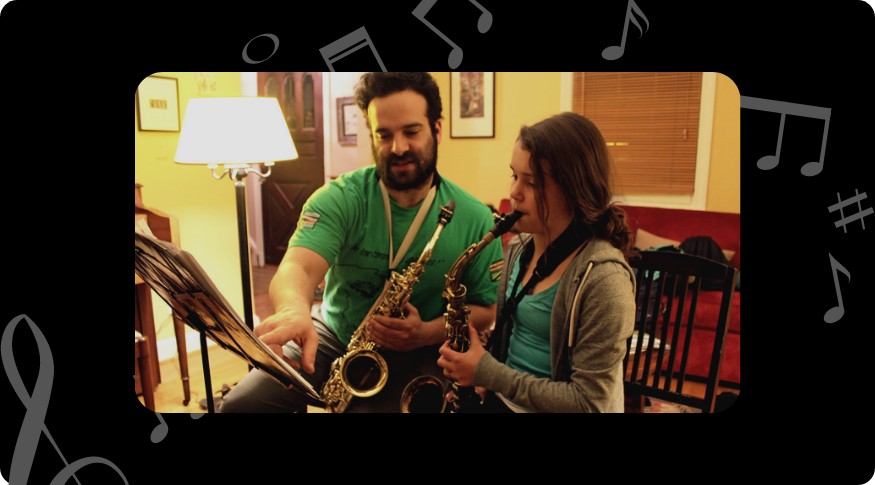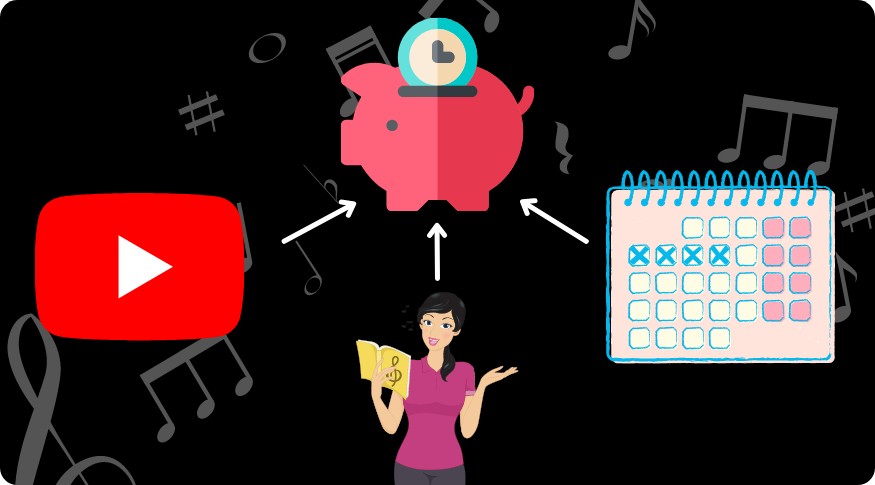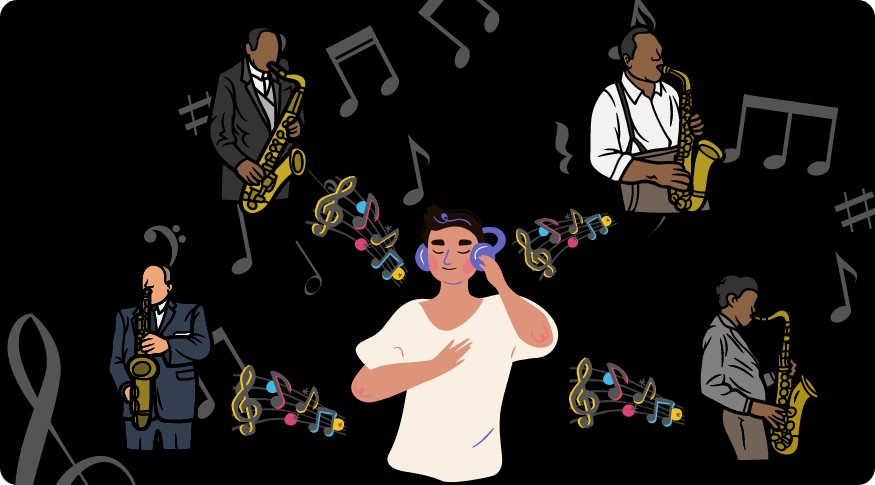Learning to play the saxophone is an exciting journey, and at LEARNS.EDU.VN, we understand your eagerness to start making music. Understanding the timeframe involved is key to setting realistic expectations and staying motivated. Discover the skills and strategies that will accelerate your progress in learning this beautiful instrument, all while enjoying the process. Learn about saxophone pedagogy, music education, and effective learning methods.
1. Understanding The Time Commitment For Saxophone Mastery
Before diving into the specifics of how long it takes to learn the saxophone, it’s essential to consider your personal commitment and learning style. Are you dedicating focused practice time each day, or are you approaching it more casually? Your willingness to invest time and effort significantly impacts your progress. Remember, consistent, deliberate practice is more effective than sporadic, lengthy sessions.
The journey of learning the saxophone is unique to each individual, influenced by factors such as prior musical experience, natural aptitude, and the quality of instruction. While some may pick up the basics relatively quickly, achieving true mastery requires dedication, patience, and a strategic approach to learning. Setting realistic goals and understanding the technical knowledge required are crucial for a successful and fulfilling musical experience.
2. Essential Technical Skills For Saxophone Playing
Mastering the saxophone involves acquiring a range of technical skills, each contributing to your overall proficiency and musical expression. These skills include:
-
Embouchure: Developing a proper embouchure, the way you position your mouth on the mouthpiece, is fundamental to producing a clear and controlled sound. This involves precise muscle control and coordination.
-
Fingerings: Learning the fingerings for different notes and scales is essential for playing melodies and harmonies accurately. Familiarity with the saxophone’s key layout allows for fluid and efficient playing.
-
Basic Music Theory: Understanding basic music theory concepts such as rhythm, melody, harmony, and key signatures is crucial for interpreting and performing music effectively.
-
Voicing: Voicing refers to the manipulation of your oral cavity and air stream to influence the tone and timbre of the saxophone. This advanced technique allows for greater expressive control.
-
Instrument Setup: Knowing how to properly assemble, disassemble, and maintain your saxophone ensures optimal performance and longevity.
-
Mouthpiece Selection: Choosing the right mouthpiece can significantly impact your tone and playing experience. Experimenting with different mouthpieces is essential for finding the perfect fit.
-
Time Management: Effective time management is crucial for consistent practice and progress. Scheduling regular practice sessions and setting realistic goals can help you stay on track.
-
Articulation: Articulation refers to the way you start and end notes, creating different musical effects and phrasing. Mastering various articulation techniques adds nuance and expression to your playing.
-
Musical Knowledge: Expanding your general musical knowledge through listening, studying scores, and attending concerts enhances your understanding and appreciation of music.
-
Goal Setting: Setting clear and achievable goals provides direction and motivation throughout your learning journey. Break down larger goals into smaller, manageable steps to track your progress.
-
Passion for Saxophone: Above all, a genuine passion for the saxophone fuels your dedication and perseverance, making the learning process more enjoyable and rewarding.
Taking a methodical approach to learning these skills is essential for efficient progress. By breaking down the learning process into smaller, manageable steps, you can systematically develop each skill and build a strong foundation for advanced playing. Remember, consistent practice and a willingness to learn are key to unlocking your full potential as a saxophonist.
3. The Value Of A Saxophone Teacher
While self-directed learning can be effective, the guidance of a qualified saxophone teacher offers invaluable benefits that can significantly accelerate your progress and prevent the development of bad habits.
A skilled teacher provides personalized instruction tailored to your individual needs and learning style. They can identify areas for improvement, offer targeted exercises, and provide constructive feedback to help you refine your technique and musicality.
One of the most significant advantages of working with a teacher is their ability to spot and correct bad habits early on. Poor embouchure, incorrect fingering, and improper breathing techniques can hinder your progress and even lead to physical discomfort or injury. A teacher can guide you towards proper technique, ensuring a solid foundation for future development.
Furthermore, a teacher can provide motivation, encouragement, and accountability, helping you stay on track and overcome challenges along the way. They can also introduce you to new musical styles, repertoire, and performance opportunities, broadening your musical horizons and enhancing your overall learning experience.
Fortunately, finding a great saxophone teacher is easier than ever. Many experienced instructors offer lessons online or in person, providing flexible options to suit your schedule and budget.
If private lessons are not feasible, consider joining a local band or ensemble, where you can learn from experienced musicians and receive feedback in a supportive group environment. Online resources such as instructional videos, forums, and online communities can also supplement your learning and provide valuable insights.
Some recommended books include:
- The Art Of Saxophone Playing by Larry Teal: This comprehensive guide covers all aspects of saxophone technique, from embouchure and tone production to articulation and improvisation.
- Top Tones for the Saxophone by Sigurd Rascher: This advanced method focuses on developing upper-register playing and expanding your tonal palette.
- Essential Elements for Saxophone: This user-friendly method is designed for beginners and provides a step-by-step approach to learning the fundamentals of saxophone playing.
Remember, investing in quality instruction and resources is an investment in your musical growth and enjoyment. With the right guidance and support, you can achieve your saxophone playing goals and unlock your full musical potential.
4. Realistic Timeframes For Learning The Saxophone
Determining a realistic timeframe for learning the saxophone depends on several factors, including your practice commitment, learning style, and goals. However, some general guidelines can help you set realistic expectations and plan your learning journey.
-
Beginner Level (6-12 months): At the beginner level, you can expect to learn the fundamentals of saxophone playing, including proper embouchure, basic fingerings, and simple melodies. Consistent practice of 30-60 minutes per day, combined with regular lessons or guidance from a teacher, can help you achieve significant progress within this timeframe.
-
Intermediate Level (1-3 years): Reaching the intermediate level involves expanding your technical skills, learning more complex scales and chords, and exploring different musical styles. At this stage, you can begin to tackle more challenging repertoire and develop your improvisational skills. Consistent practice and ongoing instruction are essential for continued growth.
-
Advanced Level (3+ years): Achieving advanced proficiency on the saxophone requires years of dedicated practice, study, and performance experience. At this level, you can master advanced techniques, develop a unique personal style, and perform at a professional level. Continuous learning and exploration are key to pushing your boundaries and reaching your full potential.
Remember, these timeframes are just estimates, and your individual progress may vary. The most important factor is consistent effort and a passion for learning. As Chris Smith demonstrates in his video documenting his first six months of daily practice, consistent effort yields tangible results.
Realistically, it takes between six months to a year to really learn how to play the saxophone. That means maintaining the skill long after you have stopped playing regularly.
5. Strategies For Accelerated Learning
For those with limited time or a desire to accelerate their learning, certain strategies can help you maximize your progress and achieve your goals more efficiently.
-
Focused Practice: Instead of mindlessly repeating exercises, focus on specific areas for improvement and practice with intention. Break down complex passages into smaller, manageable sections and work on them until you achieve mastery.
-
Effective Use of Resources: Take advantage of the wealth of online resources available, including instructional videos, tutorials, and online communities. Supplement your learning with books, sheet music, and recordings of great saxophonists.
-
Immersive Learning: Immerse yourself in saxophone culture by attending concerts, listening to recordings, and connecting with other musicians. Surrounding yourself with the instrument and its music can fuel your passion and motivation.
-
Seek Feedback: Regularly seek feedback from teachers, mentors, or peers to identify areas for improvement and gain valuable insights. Constructive criticism can help you refine your technique and musicality.
-
Set Realistic Goals: Set clear, achievable goals and track your progress to stay motivated and focused. Celebrate your accomplishments along the way and don’t get discouraged by setbacks.
Learning an instrument in a short period of time requires a special type of focus. You will be tired from the work you do, and your results will be limited.
Even still it is possible, and the saxophone is, fortunately, an instrument that you can make sounds on quite quickly. My first student had a working sound on his first day, but I definitely wanted him to continue improving his sound.
Had he not had a teacher, he would have had to be resourceful in teaching himself. Luckily, there are many great videos on learning the saxophone.
6. The Role Of Passion And Enjoyment In Learning
While technical proficiency is essential, the role of passion and enjoyment cannot be overstated. Learning the saxophone should be a fulfilling and enjoyable experience, not a chore.
When you are passionate about playing, you are more likely to stay motivated, practice consistently, and overcome challenges along the way. Choose music that you love to play, and find opportunities to perform and share your music with others.
Remember, the journey of learning the saxophone is a marathon, not a sprint. Enjoy the process, celebrate your progress, and never stop exploring the endless possibilities of this wonderful instrument.
Being on the grind to become a saxophonist doesn’t have to be miserable. Yes, you will work on things that are a bit technical like fingerings, embouchure, and instrumental setup, but you will also do it because it is the key to playing songs you love on an instrument that fits it quite well.
Yes, you could learn Gerry Rafferty’s “Baker Street” on a toy saxophone like this guy.
I was in Home Goods 30 minutes ago looking at this toy saxophone thinking, “I wonder how long it would take to learn Gerry Rafferty’s “Baker Street” on that?” pic.twitter.com/uY0LXliPcg
—
MIKE NORTON
(@themikenorton) December 15, 2018
Or you could take the time to learn the saxophone and let it sing beautifully like it was meant to be heard. You might even enjoy the differences saxophone has from other instruments like the trombone which you can read about in this article.
Either way, a working repertoire of saxophone songs such as “Take Five”, or “Careless Whisper” will go a long way to really solidify your playing. That and you will be much more motivated to learn the instrument.
You won’t struggle to learn the saxophone too much if you learn tunes like “Careless Whisper” either. These two otters might disagree with you though, or they might just dance to your wonderful playing when listening to their favorite recording of you which you can learn to do in this article.
It is once again Saxophone #Sotterday pic.twitter.com/m2jOORXXQn
— Otter Braun (@otteritarian) January 29, 2022
7. Maintaining Consistency In Your Saxophone Journey
Consistency is paramount when learning any musical instrument, and the saxophone is no exception. Regular practice, even in short bursts, is far more effective than sporadic, lengthy sessions. Aim to establish a daily practice routine and stick to it as much as possible.
Surrounding yourself with saxophone culture can also help you maintain consistency. Listen to great players, attend concerts, and connect with other musicians. This immersion can fuel your passion and provide inspiration during challenging times.
When you encounter difficulties or setbacks, remember to pace yourself and stay positive. Learning the saxophone takes time and effort, but with perseverance and dedication, you can achieve your goals.
Yes, it’s great to have saxophone as a fun hobby but remember to pick it up often. The instrument should be an extension of you, and just like exercise, it works when you do it consistently.
Listening to great players and surrounding yourself in saxophone culture can help you maintain this much needed consistency. There’s a plethora of music to explore with this musical instrument so I guarantee you will never be bored playing sax.
8. Resources At LEARNS.EDU.VN For Aspiring Saxophonists
At LEARNS.EDU.VN, we are committed to providing aspiring saxophonists with the resources and support they need to succeed. Our website offers a wealth of valuable information, including articles, tutorials, and reviews of instruments and accessories.
We also offer a range of online courses taught by experienced saxophone instructors, covering topics such as:
| Course Title | Description | Level |
|---|---|---|
| Beginner Saxophone Basics | A comprehensive introduction to the fundamentals of saxophone playing. | Beginner |
| Intermediate Saxophone Skills | A deeper dive into scales, chords, and improvisation techniques. | Intermediate |
| Advanced Saxophone Mastery | Mastering advanced techniques and developing a unique personal style. | Advanced |
| Jazz Improvisation for Sax | Learn the art of jazz improvisation and develop your own unique voice. | All Levels |
| Saxophone Maintenance and Care | Learn how to properly care for your saxophone and keep it in optimal playing condition. | All Levels |
Our courses are designed to be flexible and accessible, allowing you to learn at your own pace and on your own schedule. Whether you are a complete beginner or an experienced player, we have something to offer you.
9. Embracing Lifelong Learning In Music
Many view music as a life-long endeavor. I agree! Learning the saxophone is not just about acquiring technical skills; it’s about embarking on a journey of lifelong learning and discovery. Embrace the challenges, celebrate the victories, and never stop exploring the endless possibilities of music.
As you progress on your saxophone journey, continue to seek out new knowledge, experiment with different styles, and connect with other musicians. The more you learn, the more you will appreciate the beauty and complexity of music.
Remember, the joy of playing music lies not just in the destination, but in the journey itself. Embrace the process, stay curious, and never stop learning.
10. Frequently Asked Questions (FAQ) About Learning Saxophone
- Is the saxophone hard to learn? The saxophone can be challenging, but with consistent practice and proper instruction, it is achievable for most people.
- How much does a saxophone cost? Saxophones range in price from a few hundred dollars for a student model to several thousand dollars for a professional instrument.
- What type of saxophone should I start with? The alto saxophone is generally recommended for beginners due to its manageable size and comfortable key layout.
- Do I need to know how to read music to play the saxophone? While it is helpful, it is not essential. Many successful saxophonists learn to play by ear or through tablature.
- How often should I practice? Aim for at least 30 minutes of practice per day, five days a week, for optimal progress.
- What are some common mistakes that beginners make? Common mistakes include improper embouchure, poor posture, and inconsistent practice habits.
- How can I improve my tone? Improving your tone requires consistent practice, focused listening, and experimentation with different mouthpieces and reeds.
- What is the best way to learn scales and chords? Use online resources, instructional books, or consult with a teacher to learn scales and chords effectively.
- How can I find a good saxophone teacher? Search online directories, ask for referrals from local music stores, or consult with your school music program.
- What are some good songs for beginners to learn? Simple melodies with basic fingerings, such as “Mary Had a Little Lamb” or “Ode to Joy,” are good choices for beginners.
Useful Links
[Link to a beginner saxophone guide]
[Link to saxophone maintenance tips]
[Link to online saxophone lessons]
Final Thoughts
Learning to play the saxophone is a rewarding and enriching experience that can bring you joy and fulfillment for a lifetime. By following these guidelines, setting realistic expectations, and dedicating yourself to consistent practice, you can achieve your musical goals and unlock your full potential as a saxophonist.
Remember, the journey of learning the saxophone is a marathon, not a sprint. Enjoy the process, celebrate your progress, and never stop exploring the endless possibilities of this wonderful instrument.
Visit LEARNS.EDU.VN today to discover more resources and courses that can help you on your saxophone journey. Our address is 123 Education Way, Learnville, CA 90210, United States. Contact us on Whatsapp: +1 555-555-1212. Visit our website: LEARNS.EDU.VN to explore our offerings. Let learns.edu.vn be your partner in achieving your musical dreams.






